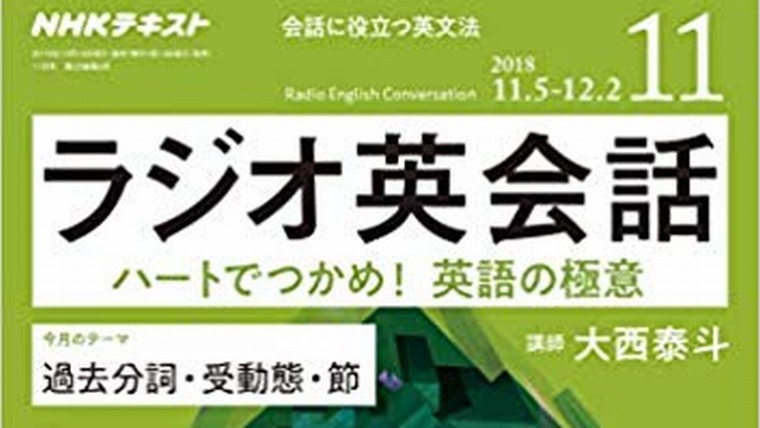ラジオ英会話 L143 2018/11/7日【ディクテーション付き】

ラジオ英会話のディクテーションを始めた、一番最初の投稿です。記念碑的に公開しておきます。^^
今日からNHKラジオ英会話で勉強することにしました。
「レッスン143 受動態① 受動態の基本」です。
ラジオ英会話を聞いて勉強するのは30年ぶりくらいかな・・・・。
なんだか親しみやすくなっていて文法の説明も分かりやすいし、期待して進めてみます。
今日習うテーマは受動態①です。
キーセンテンス
受動態の文
All the photos were taken by my boyfriend.
動詞+過去分詞の例
John got fired this month.
They became scared.
これらの文は「We are happy.」と同じ形の文だ、という説明です。つまり、
主語 = 説明語句
で同じ形だという説明です。
受動態は、過去分詞を使った、単なるbe動詞の文だ、とも言ってました。
おー、これはなかなか良いではないですか。
昔話ですいません・・・
むか~しの話ですが受動態を習った時は、能動態の文章の下に受動態の文章を書いて、
- 主語が後ろに行って、
- 目的語が前に出てきて、
- 動詞をbe+過去分詞に変えて、
とやたらめったら矢印をいっぱい書いた説明を受けましたよね。
そして能動態→受動態の書き換え練習をいっぱいやりました。
でも、このラジオ英会話の説明のように、
- be動詞+形容詞と同じようにbe動詞+過去分詞にするだけです。
- got+過去分詞もbecome+過去分詞も同じです。
って説明の方が本質的で分かりやすいです。
ディクテーション
講師とパートナーが英語で会話するところです。
聞けばだいたい意味は分かるのですが、ちゃんと文字に落とそうとすると結構タイヘンです!かなり時間がかかりました・・・。
間違ってたら教えてください!
spoilについて
So, can you give me the nuance of "spoil"?
The "spoil" usually means something that's not usable any more.
Ya like you know, if you have a fruit just the light amount of sun will make it ripe but too much sun will make it spoil and rotten.
And we often say like in this sentence, we could say "Dan is spoiled rotten by his parents." It's a good combination.
ripe: 熟した
rotten: 腐った
get promotedについて
So ah, could you tell me the difference between "I finally was promoted." and "I finally got promoted."?
Well, this is related to what we often say about the verb "get".
You know, "was promoted" just means that's the state you've reached. But "got" always involves a process. So this person... we get the idea that they were waiting for a long time, they were doing their best and hoping to get the promotion.
Therefore the word "the finally" matches very well. Because we get this to say "Ah, finally I get promoted."
受動態の説明
Right, all we have to do is to put the past participle after the be verb.
Ya, peace of cake.
past participle: 過去分詞
be verb: be動詞
peace of cace: 簡単
単語
WORDS & PHRASESにある単語で、割と基本的なもの(よく使いそうなもの)を、英英辞典で確認してみます。
割と英文が読みやすいCollins Cobulild辞典で、と思ったら今どきはオンラインで使えるみたいです。
fabulous
[adjective] If you describe something as fabulous, you are emphasizing that you like it a lot or think that it is very good.
exactly
[adverb] You use exactly before an amount, number, or position to emphasize that it is no more, no less, or no different from what you are stating.
absolutely
[adverb] Some people say absolutely as an emphatic way of saying yes or of agreeing with someone. They say absolutely not as an emphatic way of saying no or of disagreeing with someone.
全てCollins Dictionaryからの引用です。
最後に
ちょちょいのちょい、で1記事作ろうと思ったら、結構時間かかっちゃった。
毎日続けられるかな・・・・。

